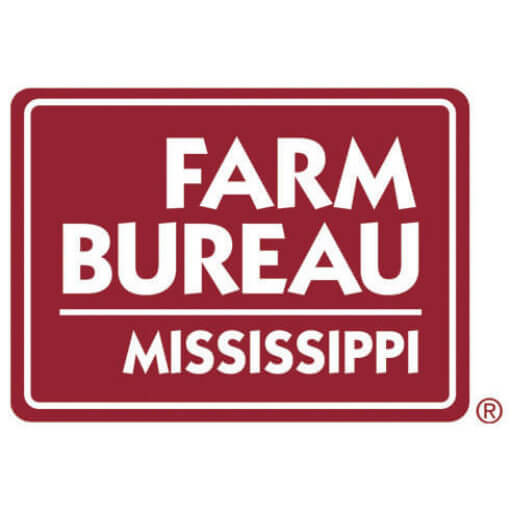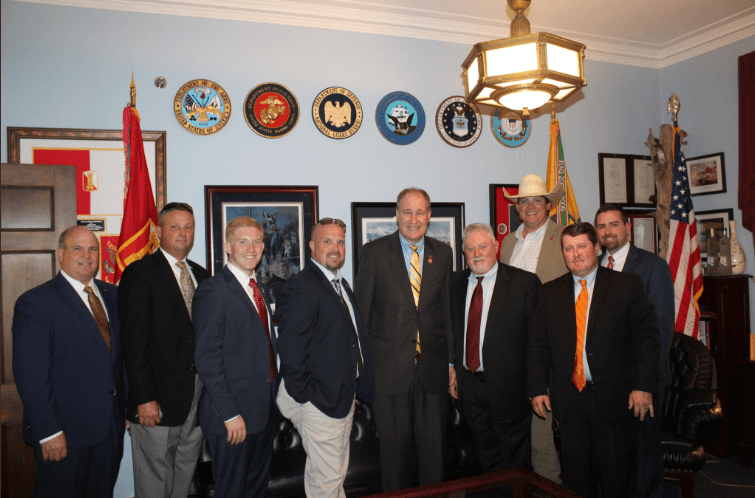Mississippi Farm Bureau Federation leaders from the beef, poultry, and small ruminant committees and staff recently traveled to Washington, D.C. to address several on-going policy issues within the livestock sector.
The group meet with several key industry professionals on the national level to share their concerns.
- Engagement with American Farm Bureau Federation and Animal Agriculture Alliance Staff: MFBF leaders first visited with Kay Johnson, Executive Director of the Animal Agriculture Alliance, for an update on the Fair Oaks Farm issue, as well as other activists activities. Johnson highlighted some concerns she was monitoring in reference to relationships the Humane Society of the United States has with the Trump family and White House. She also shared HSUS’s news strategy in regard to religious and spiritual affiliation of animal rights and care. The group also met with AFBF President Zippy Duvall and staff for an overview of livestock-related federal policy issues.
- Grain Inspection, Packers and Stockyards Administration: MFBF leaders met with USDA Agricultural Marketing Service Administrator Bruce Summers to discuss the department’s on-going efforts of finalizing the final proposed rule of GIPSA, authorized by the 2008 Farm Bill. Summers said the proposed rule was still within the department clearance process, and would likely be out for public comment in the fall. There will be a 60-day comment period. Producers can expect the final rule to take effect in the spring of 2020.
- Disease Traceability: While at USDA, the group with met Caleb Crosswhite, Counsel and Advisor to Under Secretary Greg Ibach, concerning disease traceability and USDA’s efforts to establish a national disease traceability program. Crosswhite mentioned the department was providing funding for voluntary pilot programs and is still in the phase of communication with stakeholders in this process. MFBF leaders stressed how much of a challenge implementation of this program will be. In essence, USDA not close to implementing national animal disease traceability protocol.
- ELDs for Livestock Haulers: MFBF leaders met with Andrew Neely, Senate Commerce Committee staff, and Neal McMillen and Jacob Smithstaff, staff from the personal office of U.S. Senator Roger Wicker, on the issue of electronic logging devices for livestock haulers. The leaders requested the committee support an amendment to the upcoming surface transportation bill that would include a 150-mile “back end” provision to allow for 11 hours of drive time on top of the 150-mile “front end” provision. This would provide livestock haulers with a 15-hour drive time limitation. The committee staff was open to the idea and agreed to continue dialogue with MFBF and other stakeholders.
- Check-Off Protection: The group met with Chelsie Keys, Senate Ag Committee staff, regarding the on-going issue of check-off protection from activist group attacks. Keys encouraged MFBF members to continue talking about the issue, and to coordinate with other commodity groups to launch a concerted effort to combat the anti-animal Ag groups.
- WOTUS and CERCLA-EPCRA: MFBF leaders also met with officials from EPA in regard to the new proposed clean water rule, as well as and the CERCLA-EPCRA reporting requirements Mississippi’s farmers and ranchers are not exempt from at this time. EPA staff provided updates in the process on both proposed rules.
“It is increasingly important for our members to continue taking these trips to Washington,” Mississippi Farm Bureau Federation President Mike McCormick said. “I commend this group for asking the hard questions and representing Mississippi so well.”

